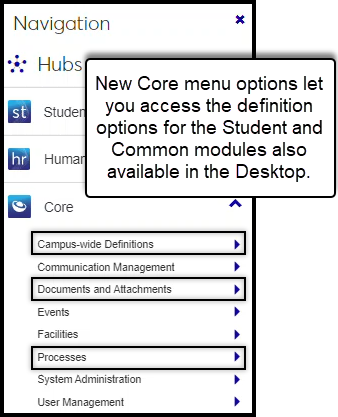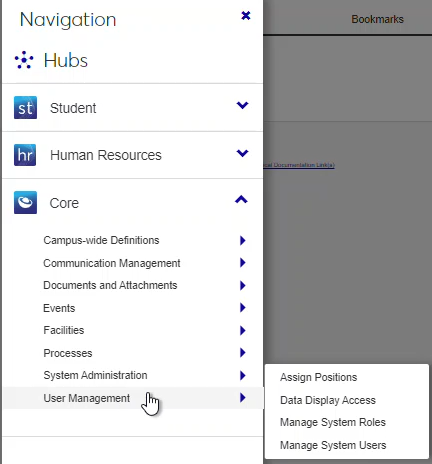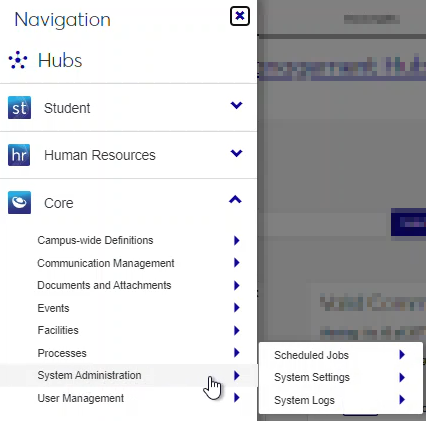System Administration
Note
The releases below include enhancements and/or resolved issues for Desktop Security & Permissions and J1 Web System Administration.
To enhance security, Exchange Online (part of Microsoft 365) will remove support for Basic Authentication with Client Submission (SMTP Auth) on March 1, 2026. Desktop and J1 Web schools using Exchange Online to send emails must update their configuration to avoid disruptions. Schools using Microsoft 365 only for other features such as calendar integration will not be impacted.
To support this change, Jenzabar updated the Communications settings in System Administration hub, System Settings. The former SMTP "J1 Client Application Service Relay Server" section is now labeled "J1 Email Relay Service" and a new "Implementation" drop-down field is available with the following options:
SMTP Relay Server via CAS
This previous option uses CAS, a Windows service installed during J1 setup, to relay emails. Schools using CAS with a relay server other than Microsoft 365 should migrate to the new SMTP Relay Server via J1 Web option.
SMTP Relay Server via J1 Web (recommended)
This new option routes emails through J1 Web using a scheduled job to connect more directly to the SMTP server. The settings match those of the CAS option. Schools relaying emails through servers other than Microsoft 365 should select this option.
Microsoft 365
This option routes emails through Exchange Online (Microsoft 365) using Microsoft Graph protocols. Schools using Microsoft 365 must migrate to this option by March 1, 2026. Once selected, clients must configure the Exchange Online options if they have not already done so for calendar sync and select the new Exchange Email Relay setting on the Exchange Online Account Settings page.
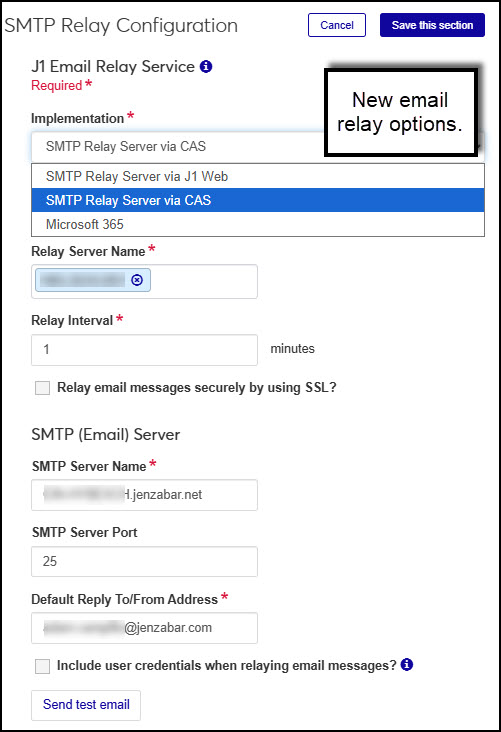
Each option includes a new Number of email messages setting, which lets you control the number of messages sent within a specified interval. This helps prevent outgoing emails from being identified as spam and reduces the risk of overwhelming the server.
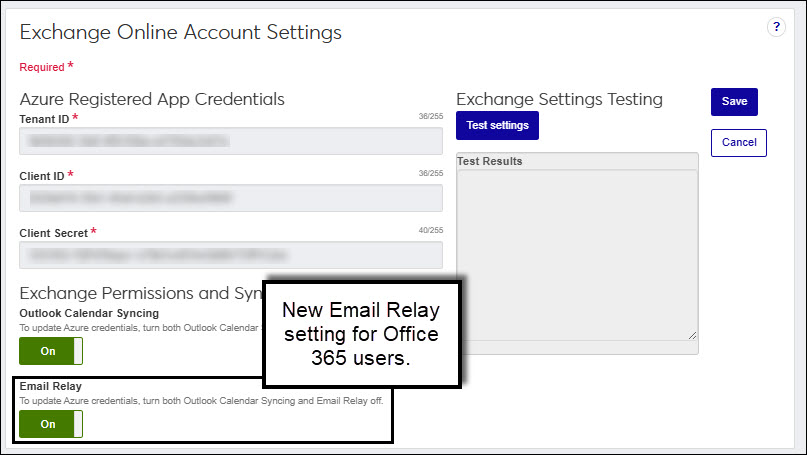
Recommendations summary:
Schools using Office 365/Exchange Online, update your SMTP configuration to the Microsoft 365 option by March 1, 2026.
Schools using CAS, migrate to the new SMTP Relay Server via J1 Web option.
All schools, if they haven't already, should install J1 Web and the latest version of CAS, then configure SMTP settings on the System Administration, System Settings, Communications. Clients using Exchange online must also update the settings on the Exchange Online Account Settings page.
Note that if your school does not use Office 365, you are not required to make changes. Moving to the SMTP Relay Server via J1 Web is a recommendation and not a requirement.
There are no updates to roles and permissions with J1 Web 2024.3.
New J1 Web log files suffixed with "-user-session" include authentication, sign in, and sign out information. Each new log entry includes a timestamp, level (level or severity), the IP address of the end user, a user identifier, and an event description.
User Action | New Log File Information |
|---|---|
Signs in with valid credentials | Authenticated and Signed In |
Signs out using the user menu or at the SSO provider’s site or the J1 or SSO session expires due to inactivity | Signed out - by [additional information] |
Attempts to sign in with invalid credentials | Authentication failed - [additional message] |
J1 Web SQL Agent Jobs Change
Jenzabar SQL agent jobs have shifted ownership from 'SA' to 'TE_PMGR'. This allows TE_PMGR to be added to the 'SQLAGentUserRole' role and removed from other roles, which ensures the users in the TE_PGMR role can only run and modify jobs they own. This supersedes their permission to delete and modify any SQL Jobs based on the other roles they belong to. Custom client SQL agent jobs are not impacted.
Impacted Jenzabar jobs:
J1 Daily BU Batches Maintenance
J1 Daily Events Maintenance
J1 Daily PA Timecards and Leave Requests
J1 Daily Permission Change Maintenance
J1 Nightly BU Maintenance
J1 Nightly Common Maintenance
J1 Nightly Global Object Cleanup
J1 Nightly Midnight AV Maintenance
J1 Nightly Midnight PA Processing
J1 Nightly Midnight Student Life Maintenance
J1 Nightly Performance
J1 Nightly Permission Full Maintenance
J1 Weekly Archive
Module | Roles | New Permissions |
|---|---|---|
Common | Campus Portal | Additional Permissions
|
Common | External Person Management | Educational Organizations
Test Scores
|
Common | Organization Management | General
|
Common | Person Management | General
Educational Organizations
|
Common | Processes | Attributes
|
Common | System Administration | Scheduled Jobs
|
Communication Management | Communication Management Licensed | Communication Management Roles
|
Web Accounts Payable | Procurement - Accounts Payable | Vendors
Payments
|
Web Accounts Receivable | Receivables Administration | Receivables Administration
|
Web Accounts Receivable | Receivables Management | Reports
|
Web Fixed Assets | Asset Administration | Forecast Depreciation
|
Web General Ledger | General Ledger Accounting: Accounts Payable Batches Adjustment Batches Charge Batches Conversion Batches Customized Batches Development Batches Disbursement Batches Financial Aid Batches Fixed Asset Batches GST Credits Batches Miscellaneous Batches Payroll Batches Processes Receipt Batches | Can post batches they created |
Web General Ledger | General Ledger Administration | General Ledger Administration
|
Web Registration | Course Information - Access to All Courses Department Head Course Access Faculty - Access to Courses and Students by Course Registrars | Users with "Can grant course authorization overrides", "Can grant course full overrides", "Can grant course prerequisite overrides", and/or "Can grant schedule conflicts" permissions can now perform these actions in the Registration Operations and Academic Department hubs. |
Web Registration | Faculty - Access to Courses and Students by Course | Users with "Can grant course corequisite overrides", "Can grant course full overrides", "Can grant course prohibited overrides", and/or "Can grant course repeat overrides" permissions can now perform these actions in the Registration Operations and Academic Department hubs. |
Web Registration | Registrars | Users with Student Management "Can delete student section records that do not have History status" and/or "Can delete student section records that have History status" permissions can now perform these actions on the Student Registration page. |
Web Registration | Registration Module Manager | Users with Student Management "Can delete student section records that do not have History status" can now perform this action on the Student Registration page. Users with Student Management "Can delete student section records that have History status" permissions can now perform these actions on the Student Section List page. |
Campus Portal Users Without ID Numbers
The Data Import Service (DIS) facilitating information exchange between J1 Web and Desktop, and the Campus Portal has been improved. Campus Portal users without ID Numbers can now be added to J1 Web as external users, eliminating the previous ID number requirement. For example, prospective employees and students who have applied through the Campus Portal can now be added to J1 Web, allowing for management and tracking of their information and communications. J1 Web also provides options to assign ID Numbers and fully integrate these users into the system as needed.
Updates to Roles and Permissions
Users in a User Management role with the “Can change what the role can access" permission enabled are able to work with the Module Access tab on Edit Role pages. There, they can enable or disable access to various interaction codes which control access to interactions.
Module | Roles | New Permissions |
|---|---|---|
Common | Communication Management Base | Additional Permissions
|
Common | Data Management | Data Mapping Templates
Imports
Additional Permissions
|
Common | Person Management | General
Person Information Relationship Details
Test Scores
|
Common | Person Management, External Person Management | Users must now be assigned to the User Management or Stand-alone User Management roles or copies of them with the Can change what the role can access enabled in order to access and use the Module Access tab on the Edit Role page. |
Common | Processes | Data Privacy
Holds
|
Common | Vehicle Administrator | Vehicle Incidents
Vehicle Management
|
Common | Workflow Base | Definitions
Workflows
Automation Plan Permissions These permissions were previously available with the Communication Management Base role.
Additional Permissions
|
Employee | Employee Administrator | Additional Permissions
Manage Definitions
|
Web Accounts Payable | Procurement - Accounts Payable | Invoices
|
Web Accounts Receivable | Receivables Administration | Receivables Administration
Additional Permissions
|
Web Accounts Receivable | Receivables Management | Student Accounts
Reports
|
Web Advising | Academic Advising Module Manager | Advising Administration
Academic Plans
|
Web Advising | Advising - Access to All Students, Primary Advisor - Access to Assigned Students, Secondary Advisor - Access to Students by Academic Program, Secondary Advisor - Access to Students by Athletic Roster |
|
Web Budget | Budget Administration | Additional Permissions
|
Web Fixed Assets | Asset Administration | Can manage blocks |
Web Fixed Assets | Asset Management Fixed Asset Access | Fixed Asset Management
Fixed Assets from Accounts Payable
|
Web General Ledger | General Ledger Accounting Processes | Processes
|
Web General Ledger | General Ledger Administration | Additional Permissions
|
Web Purchasing | Procurement Administration | Additional Permissions
|
Web Registration | Department Head Course Access | Students
|
Web Registration | Faculty - Access to Courses and Students by Course | Courses
Students
|
Web Registration | Registrars | Manage Definitions
Grades
Faculty
Student Management
Section Management
Manage Requisite Definitions
|
Web Registration | Registration - Access to All Students | Students
|
Web Registration | Registration Module Manager | Manage Definitions
Registration Settings
Student Management
Section Management
Manage Requisite Definitions
Additional Permissions
|
Web Registration | Registration Override and Access Control | Student Overrides
|
Web Registration | Registration Process Manager | Processes
|
Web Registration | Registration Reporting Module Manager | Reports
|
Web Student Conduct | Student Conduct - Assistant Director Access by Department | Incident Reports
Case Management
|
Web Student Conduct | Student Conduct - Director Access by Department | Incident Reports
Case Management
Student Conduct Roles
|
Web Student Conduct | Student Conduct - Incident Reports | Incident Reports
|
Web Student Conduct | Student Conduct - Legacy Incident Access |
|
Web Student Life | Residence Life Administrator | Incident Reports
|
Web Student Life | Student Activities Administrator | Manage Definitions
|
Web Student Life | Student Activities User by Activity | Manage Seasons
|
Web Student Life | Student Conduct Administrator | Manage Definitions
Additional Permissions
|
Web Student Life | Student Life Module Manager | Manage Definitions
Incident Reports
Additional Permissions
|
Web Student Life | Student Life Residence Assistant / Advisor (RA) | Incident Reports
|
Web Student Life | Student Life Residence Director (RD) | Incident Reports
|
Updates to Roles and Permissions
Module | Role | New Roles and Permissions |
|---|---|---|
Finance | Budget Administration | New role with Can manage settings permission lets users configure the settings that enable or disable Finance features in the Campus Portal. |
Finance | Budget Management Worksheet & Adjustment Access | Budget Activity
|
Finance | Procurement Administration | New role with Can manage settings permission lets users configure the settings that enable or disable Finance features in the Campus Portal. |
Finance | Receivables Management | Student Accounts
|
New Jenzabar Financial Aid Setting
A new Jenzabar Financial Aid setting available with the Product Installs and Sign In configurations connects J1 Web with Jenzabar Financial Aid. This connection lets your school leverage data sets that include financial aid information to select communication recipients and include personalized information using placeholders.
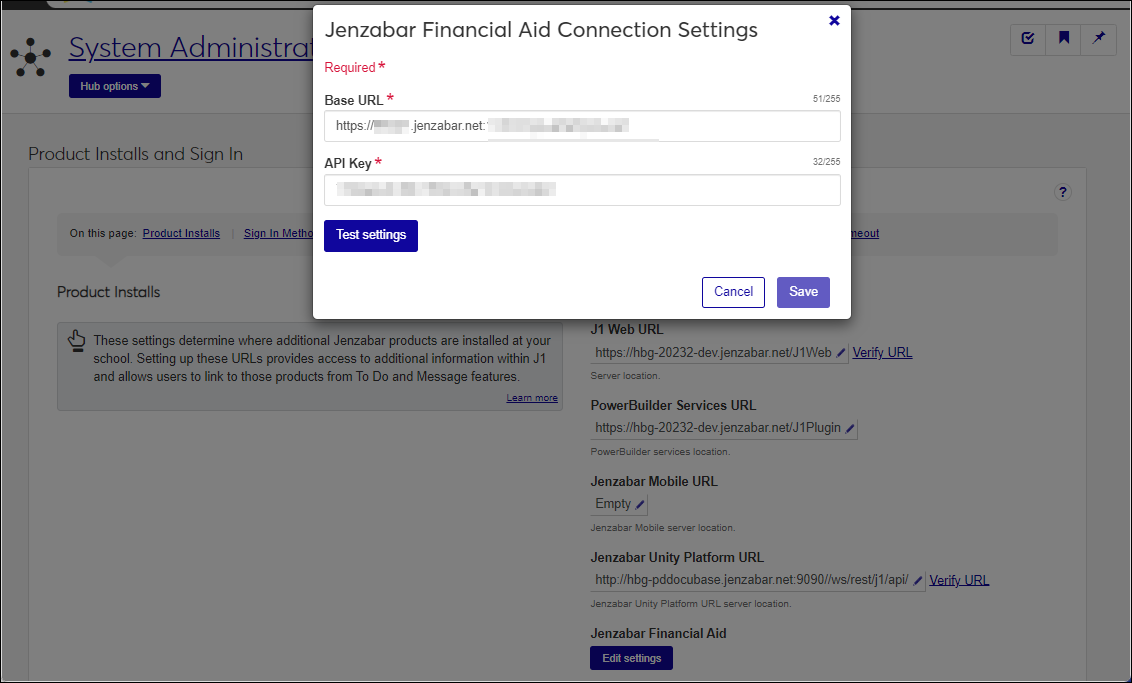
Note
To manage this configuration, users must belong to a System Administration role with the Can view & edit product installs and sign in settings permission enabled.
Additional Enhancements
Implemented a more efficient permissions calculation to improve performance.
Addressed a security vulnerability that ensures the application is further restricted from redirection.
Updates to Roles and Permissions
Module | Role | New Permissions |
|---|---|---|
Common | Organization Management |
|
Common | Person Management | Can create person now applies to the Person Management hub |
Common | Vehicle Administrator | Manage Definitions
Vehicle Management
Additional Permissions
|
Common | Campus-wide Definitions | Definitions
Additional Permissions
|
Common | Processes | Can manage blocks |
Common | User Management | Can manage blocks |
Common | Communication Management Base | Interaction Set Permissions now called Automation Plan Permissions
|
Common | System Administration | System Logs
Additional Permissions
|
Common | Facilities Manager | Can manage blocks |
Events Management | Events Module Manager | Can manage blocks |
Web Advising | Academic Advising Module Manager | Advising Administration
Additional Permissions
|
Web Registration | Registration Module Manager | Can manage blocks |
Web Student Life | Student Conduct Administrator | Can manage blocks |
Web Student Life | Student Activities Administrator | Can manage blocks |
Web Student Life | Student Health Administrator | Student Health
Additional Permissions
|
Web Student Life | Residence Life Administrator | Can manage blocks permissions available for various Student Life pages |
Web Student Life | Student Life Module Manager | Student Health
Additional Permissions
|
New View Permissions Page
The new View Permissions page lets you see the roles and privileges assigned to a selected individual in the system. View:
Person and security role pages they can access
Module interactions they can see
Lists of all their permissions or the system roles they are assigned to
Types of sensitive data they can view (e.g., salaries and social security numbers)
User-defined fields they can view/manage
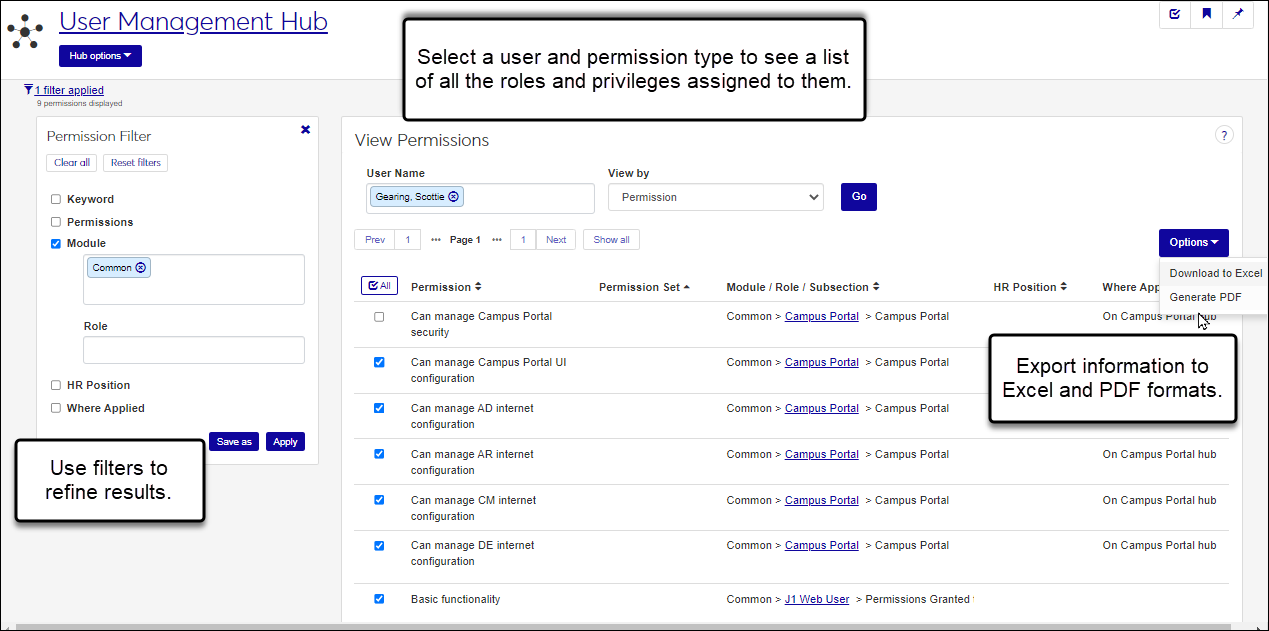 |
You can select the information you need and export it to Excel or a PDF.
Note
To access this page:
Belong to a User Management role with the Can view permissions permission enabled.
From the User Management hub option, select View Permissions.
From the Search option, select System page and enter View Permissions.
From the System Users page, select View permissions from the Options drop-down.
New Multi-Factor Universal Authentication Option
Effective March 30, 2024, Duo will cease supporting their traditional authentication prompt and require all Duo-authenticated applications to use their new universal authentication prompt.
The universal authentication process generally works the same way except full pages from Duo's site appear rather than just the Duo interface within the J1 Web Sign In page.
To accommodate this upcoming change, Duo Universal Prompt options are available with 2023.1 in the Multi-Factor Authentication Settings window (System Administration, System Settings, Product Installs and Sign In page, Sign In Method).
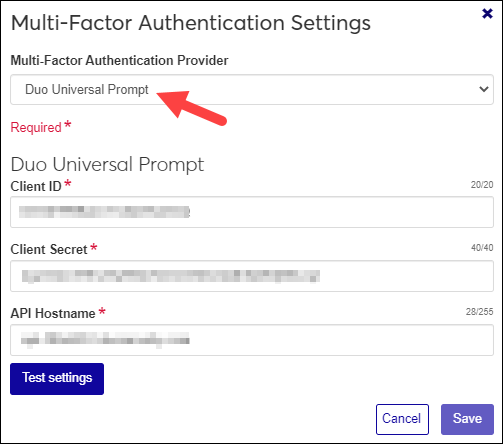 |
If you are already using MFA with Duo, you will need to establish new credentials with Duo and enter them in J1 Web for the universal prompt option by March 30, 2024. If you have not implemented MFA, follow the steps in the J1 Duo Multi-Factor Authentication for Jenzabar guide linked in the Additional Resources section below.
Additional Resources:
Single-Sign On (SSO) Updates
New Automated Logout Option Available
Previously, J1 Web sessions in SSO environments remained active until they timed out even when the SSO identity provider logged out. With 2023.1, schools using a SSO provider that supports a single logout (SLO) can use the protocol to end the J1 Web session when the SSO logs out. While this automated process can be used to log off the user, the SLO can be problematic, and the most reliable practice is to have the user completely close the J1 Web browser window when done with a session to terminate all sessions.
SSO Checking
Jenzabar now periodically checks users’ SSO session in case the provider doesn't support SLO, or it isn't working properly.
Users may momentarily see their SSO provider page or a blank page when navigating from one J1 Web page to another.
Users that remain on one page longer than SSO recheck period, a pop-up window will appear asking the user to click a button to proceed with the SSO session check. Due to browser security policies, this cannot be initiated from the software.
Interaction Access Now Module Access
Interaction Access tab on the Edit Roles page is now called Module Access. The tab is used in the same way as before, to control access to interactions. Module Access codes are associated with interactions when they are created and users in roles with the code enabled can see those interactions with that code.
Jenzabar provides module access codes based on Jenzabar modules and you can create custom ones on the Access Codes page.
New Campus Portal Configuration Options Available
New options for managing Desktop, Campus Portal configurations are available in J1 Web, Core. The following lists the new pages and links to their help topic (some topics may still be under construction but check back soon as content will be updated throughout the summer).
Note
Updates to definitions made in J1 Web are reflected in J1 Desktop and conversely J1 Desktop updates are reflected in J1 Web.
Additional Enhancements
Changes made to an individual or organization's address, phone number, or email address in Advancement are now reflected in J1 Web.
A new "Remove Expired Short Term Attachments" scheduled job removes expired rows from the AttachmentShortTerm table.
Jenzabar allows schools with unique configuration needs to override J1 Web global settings. For example, a school with a single J1 database but 2 distinct JICS instances. An IT Administrator can tailor the following JSON file settings: JicsBaseUrl, ITContactEmail, ITContactPhone, MessageAndTaskNotificationFromEmailAddress, and PbPluginBaseUrl.
If the IT Administrator updates the JSON file, the equivalent settings in J1 Web are disabled.
Contact information options for your Campus Support team have been updated (System Administration, System Settings, Communications, Contact Information for Your Support Team).
Email field is now IT Contact Email field. This email address is used as the "from" address when forwarding message and task emails.
New Recipient of Email Issues field lets you enter an email address that will receive notifications when users have issues during sign in.
Updates to Roles and Permissions
Module | Role | New Permissions |
|---|---|---|
Advising | Academic Advising Module Manager | Advising Administration options:
New Tree Building options:
|
Advising |
| New Registration Management options:
New Course Overrides options:
|
Common | Campus Portal |
|
Common | User Management | System Users options: Can view permissions |
State Reporting | Institutional Reporting Manager | Registration Settings options:, Can manage IPEDS settings |
Web Registration | Registration Process Manager |
|
Web Registration | Registration - Access to All Students | Can view withdrawal count history |
Web Registration | Registration Reporting Module Manager | Can generate student listing reports |
Web Registration | Registrars |
|
Web Registration | Registration Module Manager |
|
Web Student Life |
|
|
Web Student Life |
|
|
Issue | Description |
|---|---|
RN35465 | When using Jenzabar One Web in an SSO environment, if the SSO session was logged out, whether manually or due to a timeout, the session would remain signed in rather than being signed out as well. |
RN44608 | When none of the selected users on the Campus Portal Security page could be deleted, the pop-up presented a "Yes, delete" option rather than an "Ok" button to close the modal. |
RN45821 | The Campus Portal Product Information block in Jenzabar One Web did not show the correct current version for JICS. |
RN49070 | Certain Registration Configuration options were incorrectly allowed to be edited Registration General Configuration page. |
RN49164 | The Person Management role incorrectly granted permissions to all persons, when it should be restricted to persons the user can view based on their other roles. |
RN49169 | On the Manage System Roles page, when filtering based on a specific version, the list did not include roles that were new in that version. |
RN49287 | When upgrading to 2022.2, roles copied from the Communication Management role had some permissions turned off. |
RN49291 | For Non-HR customers, the pop-up to assign users to a position did not display all Jenzabar One Web users. |
RN49661 | The process to add or remove roles caused a time out when processing large data sets. |
RN50787 | Microsoft Exchange Calendar only returned ten calendar items, instead of all. |
RN51692 | Users in the Academic Advising Module Manager role with the "Can create role" permission enabled did not have the "Create role" button on the Manage Advising Roles page. |
RN51733 | Users not licensed for HR/PA/PE, could not remove all employees for a position via the Assign Positions page. |
RN52530 | Certain permissions on certain roles could not be disabled once they were enabled, and attempting to disable them resulted in an error. |
RN53895 | Attempting to add a user to the role "Faculty - Access to Courses and Students by Course", or any role copied from it failed and returned an error message. |
New Campus Portal Security Page
The new Campus Portal Security page lets you add J1 users to the Campus Portal and assign them to Campus Portal roles. You can create new roles; however, this only needs to be done when a new base role is added to the Campus Portal (JICS) and users need access to J1 Web and Desktop information.
Note
This page is similar to the Role Definition and Maintain Web Access Code windows in the Desktop. Previous versions of the Desktop included options for managing Campus Portal passwords; however, passwords are now entirely managed in the portal.
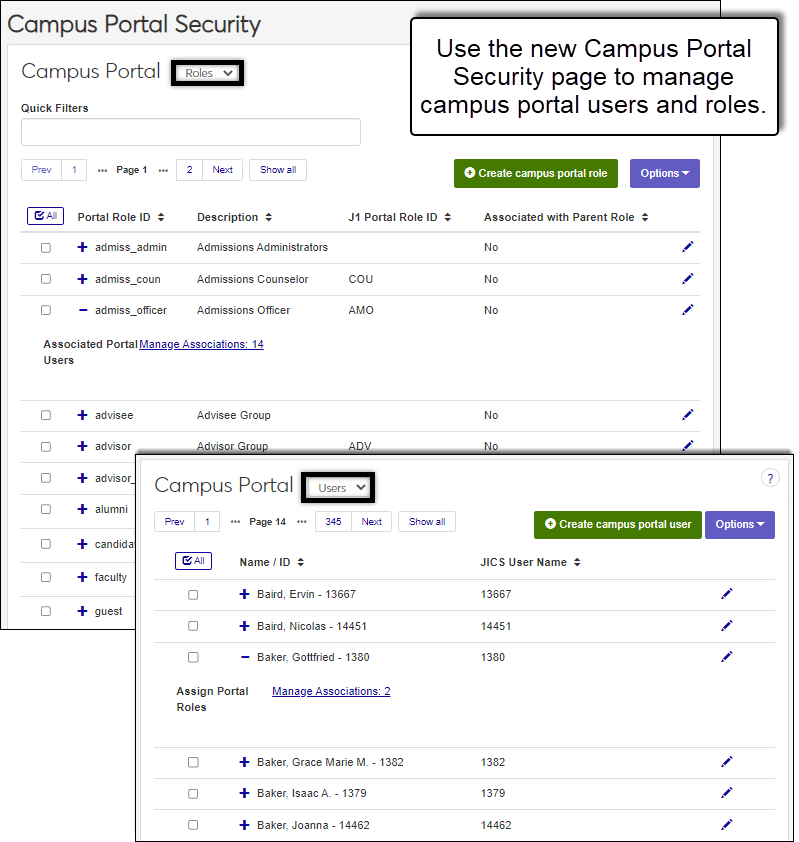
Note
To access this page, users must belong to the Campus Portal role with the Can manage campus portal security permission enabled.
New Definition Pages
Several options for managing Desktop definitions and configurations are now available in J1 Web, Core. Use the links below to access the online help for each page.
Campus-wide Definitions Hub
User Management Hub
Documents and Attachments Hub
Note
In most cases, definition information updated in J1 Web is also updated in Desktop and vice versa.
To access these pages and features, you must be in the appropriate role with proper permissions. For additional information about the roles and permissions, see the 2022.1 release notes.
New Chatbot Setting
A new Chatbot Integration setting connects Jenzabar Chatbot to Communications Plus. This allows Communications Plus users to view Chatbot threads and enable Chatbot to reply to text questions. The new setting is available under System Administration, Communications, Chatbot Integration.

Your Chatbot URL and shared secret key are available from Jenzabar's Support team https://support.jenzabar.net/.
Note
Since the original publication of the 2022.2 Release News, a new version of Chatbot was released that provides the Chabot URL and secret key. Work with your Chatbot administrator to get this information from the new Communications Integration page.
Role and Permission Updates
A new Campus Portal role allows users to manage some Campus Portal user information in J1 Web.
A new Can view historical contact info permission is available with the Organization Management and Person Management roles.
Permissions to manage contact, country, gender identity, and personal pronoun definitions are now available with the Campus-wide Definitions role.
Communication Management Base role updates:
The following new permissions are available:
Can manage blocks
Can view Configuration Status block
Can import communication contacts
Can create contacts
Permissions are now grouped and organized.
Data set permissions moved from the Jenzabar-provided Communication Management Base role to the Jenzabar-provided Campus-wide Definitions role.
The Can view & edit calendar settings and Can manage general configurations permissions available with the System Administration role are now organized in a new Other Settings section.
The following new permissions are available with the Registrars and Registration Module Manager roles:
Permissions to view, edit, create, and delete major / minor definitions
Permissions to view and manage student leaves of absence
Permission to manage source type definitions
The Can manage health group roster permission available with the Student Health Administrator and Student Life Module Manager roles now include the Student Summary page.
A new Can manage ethnicity/race information permission is available with the Person Management role and lets users enter and update ethnic/race information on the Person Information Details page, Ethnicity/ Race tab.
Issue | Description |
|---|---|
RN33234 | When configured to use single sign-on (SSO), the browser sent "update expiration" web calls for each mouse movement rather than every 15 minutes as expected. |
RN39328 | When the Allow JICS Users to Sign In Using JICS Credentials setting was set to On on the Product Installs and Sign In page, if a JICS user with an apostrophe in their name signed in, the J1 Web userid that was automatically created contained an apostrophe and resulted in an error. |
RN40939 | When the optional Validation API Key field was left blank, Email Provider settings couldn't be validated or saved (System Administration hub > System Settings > Communications). |
RN41104 | Users that weren't in roles with permission to access the Campus-wide Definitions hub or the Access Codes page were able to access the hub and the page. |
RN43106 | A J1 Web permissions stored procedure took longer to run than expected. |
RN44936 | When the PowerBuilder Services URL (Product Installs and Sign In page) had a slash at the end, users were unable to work with reports in J1 Web. |
RN45842 | DUO push for J1 Web was not working. |
RN46108 | J1 Web permissions were slow to update. |
RN46301 | On the Campus-wide Definitions, Contact Definitions page, changing an Address Code's description did not update the database table as expected. |
Issue | Description |
|---|---|
RN37882 | When active Desktop/J1 Web users were removed from the Active Directory EXAPPUSERS_<DBName> group, the APP_USER.EXiUser column was updated to 'N' during the AD Sync process. The process has been updated so that J1 Web users are not set or removed by AD Sync. |
Position Onboarding
J1 Web system roles can now be associated with your school's job positions. When employees are assigned to their position, they are added to the roles associated with the position and can access the enabled features. This saves your school from having to log in to J1 Web and assign them to the appropriate J1 Web roles. To be associated with the roles, employees must be Jenzabar One users.
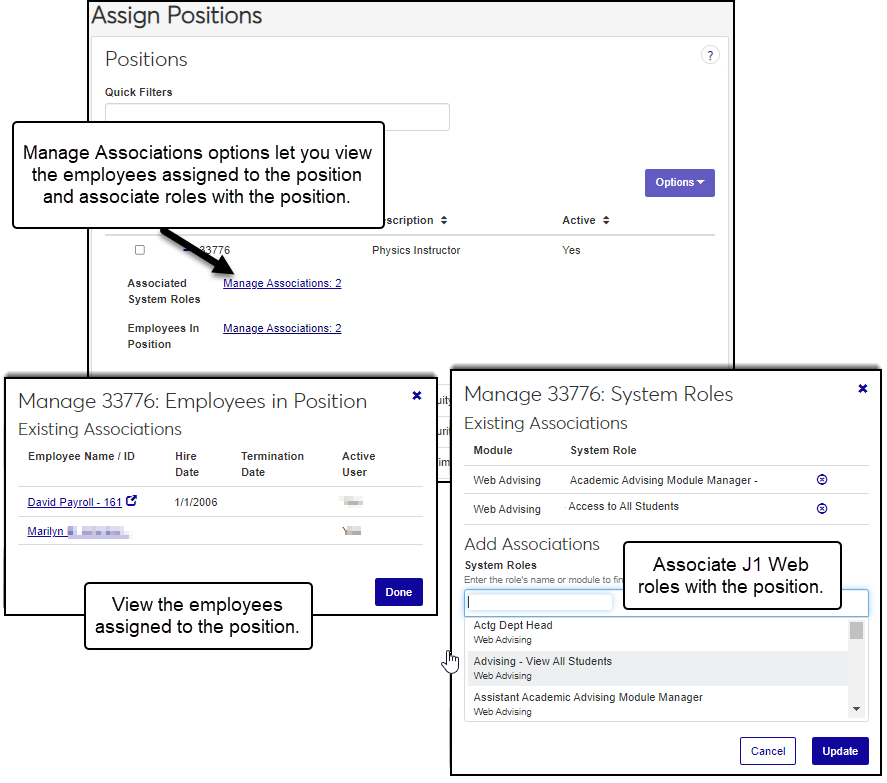
If your school has a J1 Human Resources (HR) license:
Associate your school's positions with the appropriate J1 Web roles on the new Assign Positions page. (Positions are managed on the Desktop, Organization Positions window).
When users are assigned to a position associated with J1 Web roles, they are immediately added to those associated roles and can access the enabled features. (Users are associated with positions on the Desktop, Applicant Master and HR Positions windows).
Note
As you associate the J1 Web roles with your Desktop positions, employees currently assigned to those positions are assigned to the J1 Web roles.
If your school does not have a J1 Human Resources (HR) license:
Create and manage the positions you need in J1 Web on the new Assign Permissions page.
Associate the positions with the appropriate J1 Web roles.
Assign users to the appropriate positions. Once assigned, they are added to the associated J1 Web roles.
Note
To access this page and features, users must belong to a System Administration role with the Positions permissions enabled. Schools using J1 HR do not need permission to create, update, and delete positions because positions are managed in the Desktop and appear on this page.
New Definition and Configuration Options Available
New options for managing Desktop, Common module definitions and configurations are available in J1 Web, Core. The following lists the new pages and links to their help topic (some topics may still be under construction, but check back soon as content will be updated throughout the summer).
Note
To access these new pages and features, users must be assigned to the appropriate J1 Web roles. For more information, see the Updates to Roles and Permissions section.
Note
Updates to definitions made in J1 Web are reflected in J1 Desktop and conversely J1 Desktop updates are reflected in J1 Web.
Updates to Roles and Permissions
Jenzabar 2022.1 introduces several new roles and various permission updates.
New Roles & Permissions
Many Desktop definition and configuration options for the Student and Common modules are now available in J1 Web. To grant access to these new definition options, the following new roles are available:
Note
Roles and permissions to the definition and configuration features in the Desktop are not honored in J1 Web. To grant access to the definitions and configurations in J1 Web, you must assign the users who manage them to the new J1 Web roles that control access to them.
Campus-wide Definitions role controls access to definitions for information that can be associated with individuals in the system (e.g., additional name types, tribal affiliations, military service, and ethnicity/race).
External Organization Management role controls who can view and manage information for external organizations.
External Person Management role controls who can view and manage information for external contacts as well as convert them to internal individuals.
Organization Management role controls who can view and manage name, alternate identifier, address, phone number, and alternate contact information related to organizations.
Note
Educational organizations are the only organizations available with J1 Version 2022.1. Additional organizations will be available in a future release.
Person Management role controls who can view and manage educational organizations, emergency contacts, and information related to individuals such as their contact details, tribal affiliations, military service, and ethnicity/race.
Processes role controls access to data privacy, holds, and test scores definitions.
Registration Process Manager role controls who can run academic standing, class rank, and classification update processes as well as the academic term conversion process.
Registration Reporting Module Manager role controls access to options for generating registration reports and managing IPEDS settings.
Student Activities Administrator role controls access to activity club and participation definitions.
Student Conduct Administrator role controls access to definitions for incident and section statuses, sanction and sanction statuses, violation categories and types, and involvement types.
Texas State Reporting Administrator role controls access to Texas undergraduate funding limit definitions.
User Management role controls access to system user and role pages and features as well as data display definitions.
Warning
The All Module Roles and System Users permissions that grant access to the Manage System Roles and Manage System Users pages and features are now controlled with the new User Management role. Users in a default System Administration Manager role with the All Module Roles/Systems Users Permissions enabled will lose access to these pages and features until they are assigned to the new default User Management role with the permissions enabled.
Vehicle Administrator role controls access to vehicle involvement and violation type definitions.
Note
The "can manage" permission available with many of the new definition-related roles means users can access the related definition page, and create, update, and delete those definitions.
Updated Roles and Permissions
The following lists roles with new/changed permissions:
Communication Management Base role includes the new "Can view Communication Contacts" permission.
Employee Administrator role includes the new payroll "Can manage leave requests" permission.
Facilities Manager role includes new permissions for viewing spaces as well as managing resource types, key status definitions, and campus locations.
Registration Module Manager and Registrars roles:
75 new permissions for managing registration definitions including those for CBE, IPEDS, NSC, and PESC.
13 new permissions for generating registration reports.
Student Management includes new "Can manage individual transcript notes" permission.
Student Life Module Manager role includes new permissions for managing student life definitions (e.g., activity clubs, violation categories, sanction and statuses).
System Administration Manager role:
Role is now labeled "System Administration."
New permissions for working with positions, viewing scheduled jobs, and managing process machine, general, and archive definitions.
Permissions to the Manage System Roles and Manage System Users pages and features moved to the new User Management role.
New J1 Web Permissions Reports
New J1 Web Permissions reports are available from J1 Desktop, Additional Reports.
J1 Web Permissions by User ID report provides a comprehensive list of all the J1 Web roles and permissions associated with every user in J1 Web. You can also see their additional J1 Desktop permission settings managed in J1 Web and the interaction access codes enabled for the roles to which they belong.
J1 Web Permissions by J1 Web Role report shows every role in the system and lists all the users assigned to each. You can also see if the users assigned to the role are active/inactive, the interaction access codes and permissions enabled for each role, and any module associations.
System Users Page Updates
There are several new features on the System Users page (previously the Manage System Users page):
New Tab Layout
The J1 Web Users tab offers all the same features as the Manage System Users page. You can view user information, manage the roles associated with a user, copy roles and permissions from one user to other users, and activate/deactivate users. The new Assign position is also available.
The Available for J1 Web tab shows individuals in the J1 database that have not yet been added to J1 Web. Individuals with a SQL Server username can be added to J1 Web as an authenticated user. Once added, they can be assigned to the appropriate roles.
Note
If they'll also need access to the Desktop, activate them in the Desktop (Users window) and assign them to the appropriate groups (Group Definition window).
New Remove Roles Option and Updated Assign Roles Process
Roles were previously associated with a user when Assign was selected from the Options drop-down. A new Manage system roles button accesses the new Associated Roles pop-up window where the user can be assigned to and removed from J1 Web roles.
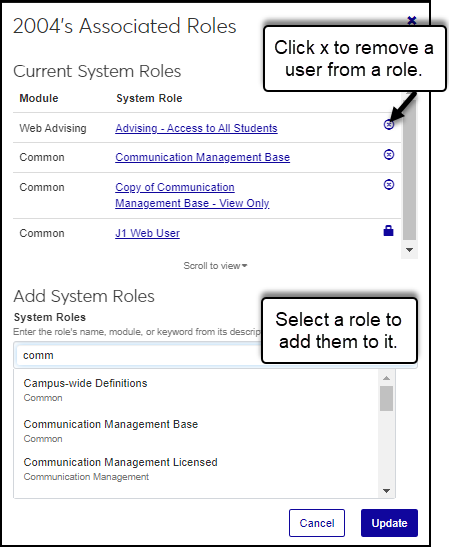
New Detailed Views Options
The new Technical Detailed Views option accesses detailed technical database information about a user such as their authentication type and conflict, SQL server information, Person and Party Role AppIDs, and authentication information that can be helpful when troubleshooting data and login issues.
The new User Technical Detailed Views option accesses detailed user information such as when they were added to the system or any updates were made, their directory and exchange service identifier information, position titles, if they are a campus portal user, and their last log ins to J1 Web/Campus Portal.
New Edit Option
A new Edit option accesses the new Edit User pop-up window where you can update the individual's UserID, Name/ID, and Description information. Changes to their UserID and Name/ID can impact their access to features in J1 Web and Desktop.
Additional Updates
New SMTP Setting Available
SMTP relay settings previously managed on the J1 Desktop's SMTP Relay Configuration window can now be managed on the System Administration hub, System Settings option, Communications page. SMTP relays run scheduled processes and can also be used to send emails from the system using Jenzabar's Client Application Services.
Note
Before these settings can be established, the Client Application Services must be installed on any workstations or servers that will be used to run scheduled processes and/or relay email messages.
New System Logs Page
Application log file information for the Advising, Common, Financial Aid Manager, and Registration modules in the APPLICATION_LOG table can now be viewed on the new System Logs page. You can see what processes were run and when, if they failed or succeeded, and who initiated the process. A View details option lets you see each record impacted by the process and if there were any errors. This information can be helpful for troubleshooting efforts.
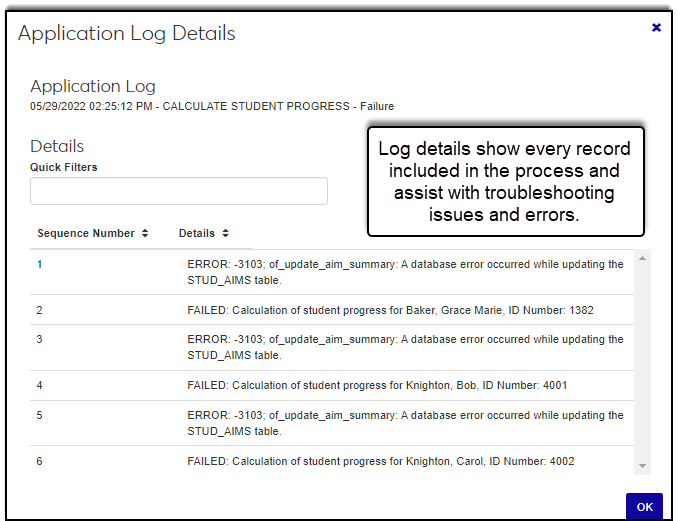
Note
To access this page, you must belong to a System Administration role with the Can manage application logs permission enabled.
New User-Defined Fields Tab
A new User-Defined Fields tab on the Edit Roles page controls permissions for viewing, editing, and configuring user-defined fields (UDEF) across the system. For version 2022.1, user-defined options are only available on the Person and Organization Information Details pages. Users that belong to multiple roles will have access to the user-defined features enabled with each.
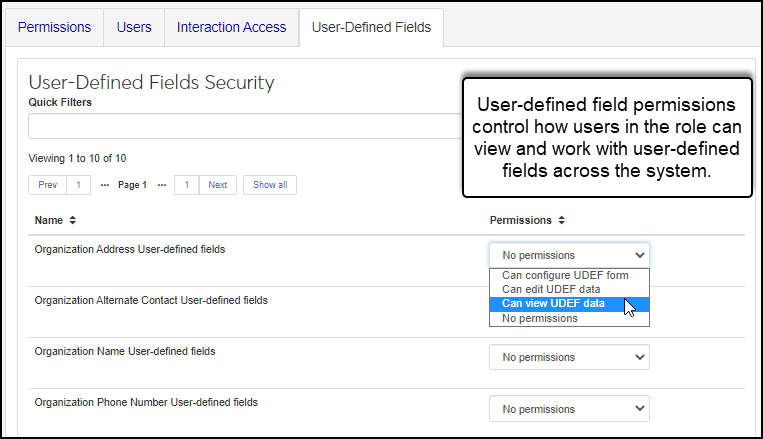
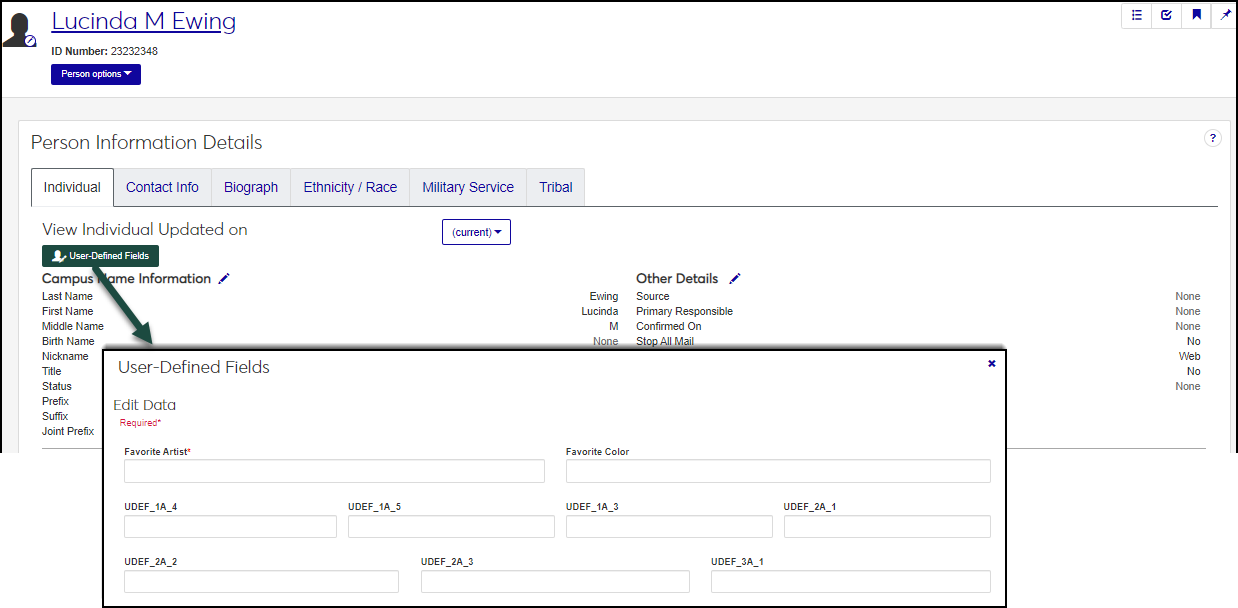
For your campus support team, the AddedByPartyAppID and AddedDate columns were added to the SecurityRoleAssignment table. These columns track who has granted J1 Web role assignments and can assist with J1 Web permission audits.
Issue | Description |
|---|---|
RN18821 | When there were selections on multiple pages, certain actions in the Options drop-down were applied only to the selections on the current page (Manage System Users page). |
RN27510 | The Users tab didn't update correctly after clicking Show all to view more users (Manage System Roles page). |
RN27511 | When the back button was clicked after applying a filter to the Manage Employees page, some of the filter options disappeared and the list was incorrectly labeled as Manage People (Manage System Users page). |
RN27512 | For multi-page selections, the Options > Assign action only assigned systems roles to the first page of selected users (Manage System Users page). |
Issue | Description |
|---|---|
RN27514 | In the event of an error while activating multiple users, the system would lock up completely, forcing them to close the browser. |
RN30296 | When attempting to sign in with multifactor authorization, the user receives a 404 error rather than proceeding to a J1 Web page after providing the second authentication factor. |
Issue | Description |
|---|---|
RN25733 | On the User Activity Reports page, an error occurred when users selected the J1 only radio button. |
Data Impacting Performance Information Available
A new Data Impacting Performance block is available on the System Administration Hub page. This block identifies data issues impacting overall system performance. Common issues include unsuitable MS SQL Server Max Memory configurations, building codes with multiple locations, and inaccurate counts of active degree seeking students. For more information, see the Data Impacting Performance help page: https://jenzabarhelp.jenzabar.com/ews/help/J1Web/released/en/data-impacting-performance-block.html
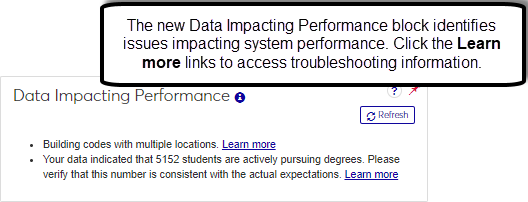
New JICS Authentication Options
J1 Web 2021.2 introduces the following new JICS Authentication options on the Product Installs and Sign In page:
A new Add JICS Advisors to J1 Web setting allows Campus Portal advisors to be added to J1 Web the first time they log in to J1 Web, which saves time on manually adding them to Desktop and enabling J1 Web access.
New Advisor Roles, Employee Roles, and Faculty Roles options let you designate which roles Campus Portal users will be assigned to when they are added to J1 Web. Users are still added to the J1 Web Users role, but you can now assign them to Jenzabar-provided or customized roles as well.
Notice
For example, you might want all newly added JICS employees to be added to a customized Full Time Employee role your school created.
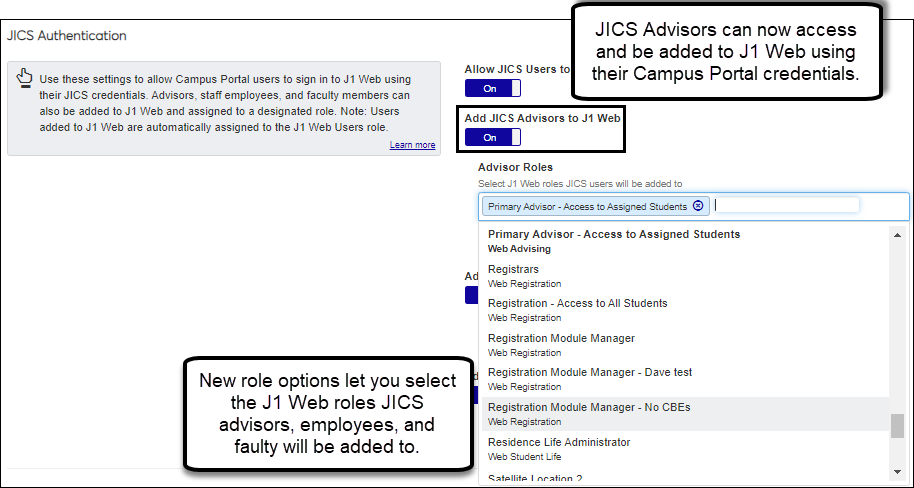
Permissions Added
New permissions are available for the following roles:
J1 Web Privacy role has a new Cannot use global Person search permission that prohibits users from searching for users from the global search options.
Registration Module Manager role has a new Can edit settings that allow students to edit variable Credit Hours and Grading Type for sections that have them permission that gives users access to the new variable credit settings in Registration.
Users assigned to the Communication Management Base role with the Can apply interactions permission enabled will now have access to re-queue interaction options.
Issue | Description |
|---|---|
RN23051 | Users who were marked inactive for J1 Web were able to sign in to it with their Campus Portal credentials. |
RN26257 | Sign-in failed with some single-sign on (SSO) environments. |
New Permissions
Several permissions have been added to the default System Administration Manager role. These permissions can be turned on and off for the default and customized System Administration Manager roles.
New Permissions for Updating Images
Images permissions allow image updates for people and locations.
Can update images for employees (on Employee pages)
Can update images for people (on Person pages)
Can update images for places
Can update images for spaces
Can update images for suites
New Permission for Data Definitions
Configuration Data permission lets users access and manage system-wide data definitions using the new Data Definitions page.
New Communication Management Role
Several Communication Management features are available in 2021.1 with a full release and detailed information available in 2021.2. To access standard features of the new Communication Management hub, assign users to the new Communication Management Base role.
New Data Definitions Page
A new Data Definitions page lets you manage address codes, alternate contact types, as well as phone carriers, masks, and types associated with contact information for individuals and organizations in J1 Web and Desktop. These new definitions are available as options in the new Phone and Alternate Contact fields on the Address tabs in J1 Desktop. For more information, see the Desktop, Common, Enhancements section.
Note
Address codes were previously managed in J1 Desktop.
The Data Definitions page lets you determine the order the system uses to find and utilize definitions as well as their order in drop-downs.
Notice
If the *CUR (Current) address code is designated the highest priority and *LHP (Legal/Home/Permanent) the second highest priority, then when communications go out, the system uses the contact information associated with a recipient's current record. If contact information for *CUR doesn't exist, then the system uses the information associated with their *LHP record.
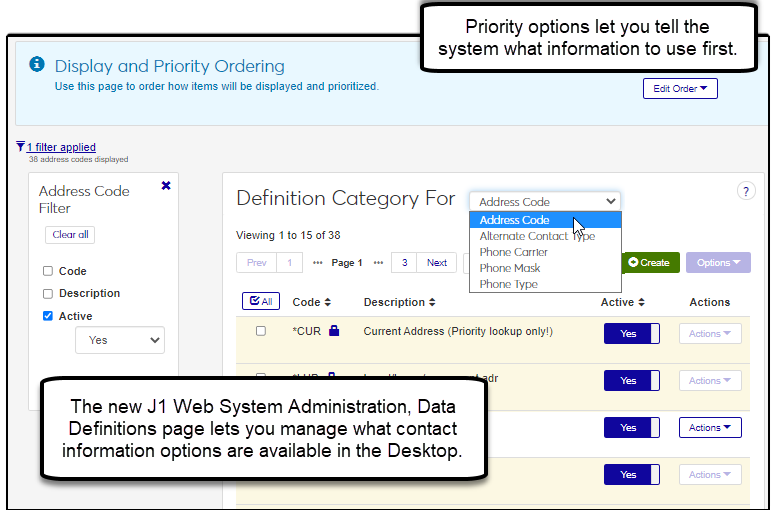 |
Issue | Description |
|---|---|
RN15133 | Student financial blocks, which are under development and not yet released, were visible to users in the Unrestricted User role. |
RN18798 | Attempting to copy the Registration Module Manager role sometimes resulted in an error. |
RN18538 | An error appeared when selecting Activate on the Manage System Users page for individuals not previously defined in J1 Web as users, employees, or faculty. |
RN18863 | On the Manage Employees page, searching using some filter combinations resulted in an error. |
RN20204 | The J1 Web installer failed to run the process that registered J1 with the online help server. J1 Web online help now works as expected. |
RN20997 | The View Student Notes table did not display if the Notepad item's description contained any tab characters. |
RN23269 | On the Products and Installs page, when Multi-Factor Authentication was selected as the Sign-In Method, an error message appeared when users clicked the Options button. |
J1 Web Privacy Role Improvements
This release includes performance improvements to the System Administration, Manage System Roles, J1 Web Privacy Role, Edit Role page.
Stored Procedure Update
Input validations have been added to the APP_USER.USER_ID and the AppID parameters of the ExiCreateExiRoleAssignment stored procedure. These parameters must be valid before existing J1 Web users can be added to J1 Web roles. If there are errors, notification messages appear in the system, –1 is returned, and a row is added to the ERROR_LOG table.
New Single Sign On (SSO) Configuration Options
New import and export Security Assertion Markup Language (SAML) metadata options let you quickly populate the Single Sign On (SSO) details as opposed to manually entering the information. This saves time and ensures case-sensitive provider information is entered accurately.
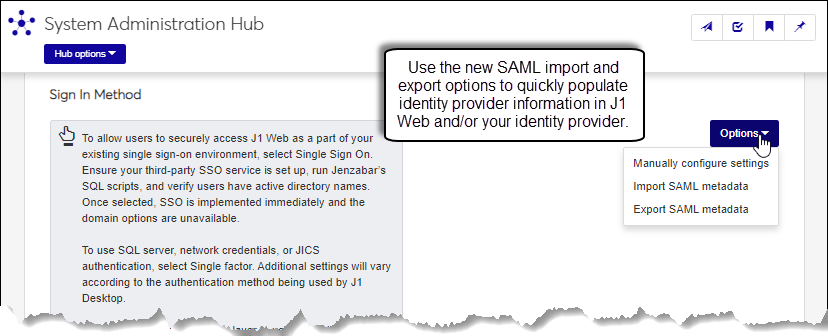
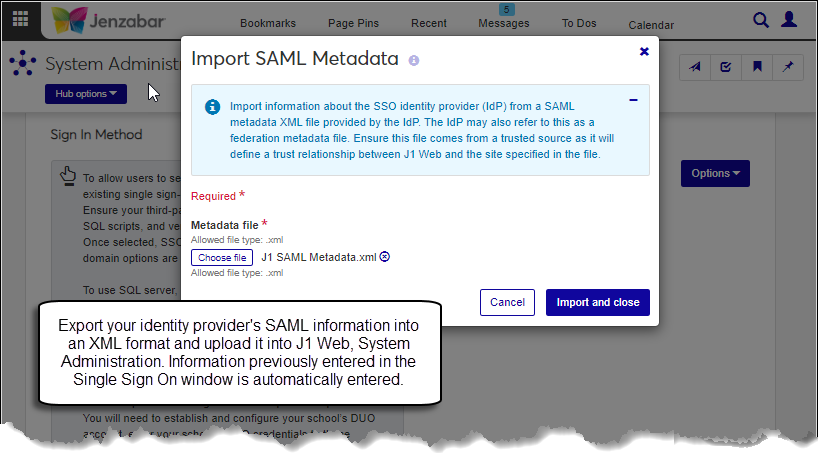
Once your identity provider's SAML information has been exported into an XML format, it can be uploaded into J1 Web, System Administration. Identity provider and SAML communication information are stored in the database and immediately applied to the SSO process. You can view the identity provider (IP) information from the Sign Sign On window.
Use the new Export SAML metadata option to export J1 Web SSO identity information in an XML file that can be imported into your identity provider.
New Role Permission for Events Module
Jenzabar added a new role permission called ‘Can be added as an Event Coordinator’. This permission allows users to create and edit events without automatically being added to Event Coordinator drop-downs.
Users must have this permission to be included in the Event Coordinator drop-downs on the following pages:
Create Event Wizard | Event Basics page
Event page | Contacts block
Review event details page | General Information pop-up
Manage Event Settings page | Event Requests Team field
Caution
Existing custom Event Coordinator roles will have the 'Can be added as an Event Coordinator' permission turned off by default.
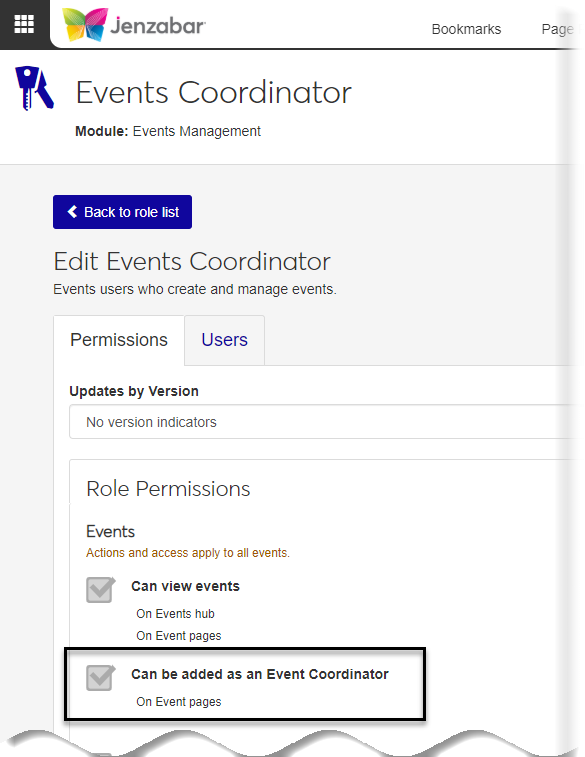
Multi-Factor Authentication Settings Update
Changes to your multi-factor authentication settings are now applied as soon as you save. This means you no longer have to reset the IIS (Internet Information Services) for updates to take effect.
Issue | Description |
|---|---|
199347 | An error message appeared when users tried to access the Product Installs and Sign In page. |
Exchange Service Name Now Available on the Users Window
The Exchange Directory Service Name (EXCHANGE_SERVICE_USERNAME) added to the database with 2019.4 is now available as a new column on the Users window. This column allows schools to use SSO and the Exchange calendar functionality without user principal name (UPN) issues.

New Notification on the Users Window
When an ID Number is changed on the Users window, a new notification appears letting system administrators know the change could impact the user’s permissions.
New SSO Settings
The following new settings in System Administration (Product Installs and Sign In) let your school set up Active Directory authentication in J1 Web as opposed to managing those configurations in the ProviderConfiguration.table.
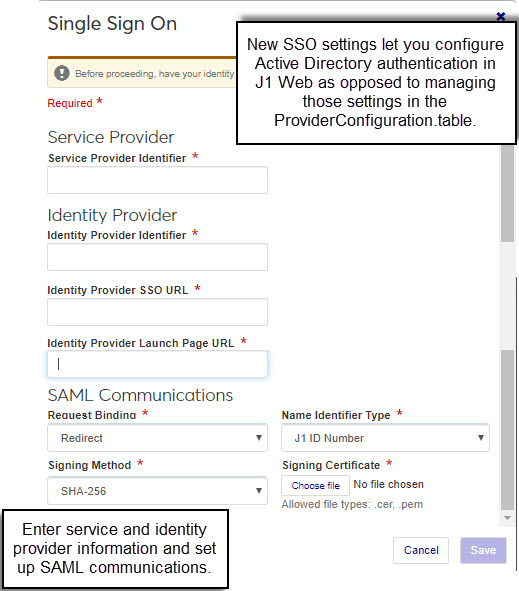
Setting | SSO Configuration |
|---|---|
Service Provider Identifier | Name used to identify your J1 site in the SSO environment. For example, https://www.yourschool.edu/J1Web |
Identify Provider Identifier | Identity provider’s name/identifying information. Typically the identity provider’s base URL. |
Identity Provider SSO URL | URL your identity provider generated to redirect J1 Web users. |
Identity Provider Launch Page URL | URL your identity provider generated to appear when users sign out of J1 Web. |
SAML Communications |
|
New Permissions
New Permissions are available for the following roles:
Employee Administrator has new view, edit, and create Payroll Calendar permissions
Registrar
Can add student divisions
Can add programs
Can add student term table records
Registration Module Manager
Can add student divisions
Can add programs
Can add student term table records
Issue | Description |
|---|---|
194846 | Signing into J1 Web failed for users whose NAME_MASTER.LAST_NAME value included an apostrophe. |
194882 | The Academic Advising Module Manager role was not providing sufficient permissions to use the Manage Advising Roles page. The page was appearing blank for users in that role (except when they were also in another role providing the necessary permissions). |
195094 | The System Users page failed to display rows when more than 2,100 people were defined as Employees or as Faculty when picking those respective views. |
New Single Sign On Configurations
To make setting up SSO easier, a new Single Sign On window is available from the Product and Installs page, and lets you manage identity provider information and SAML communication configurations.
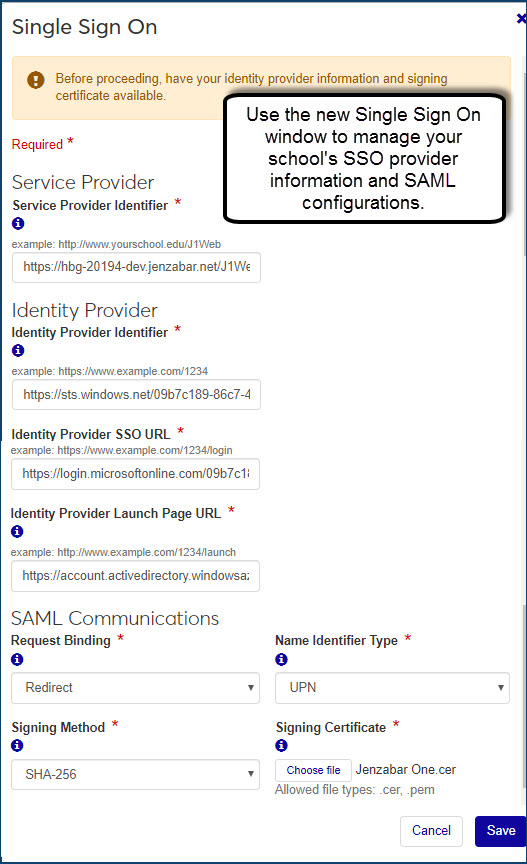
Detailed configuration information is available in the J1 Web System Administration SSO Implementation Guide and online help. [need link to Sys Admin help]
System Role Updates
New Tabs on Edit Role Page
To improve overall usability, permissions and users related to a role have been broken out into separate tabs. Features for updating role permissions, and managing users assigned to roles remain the same.
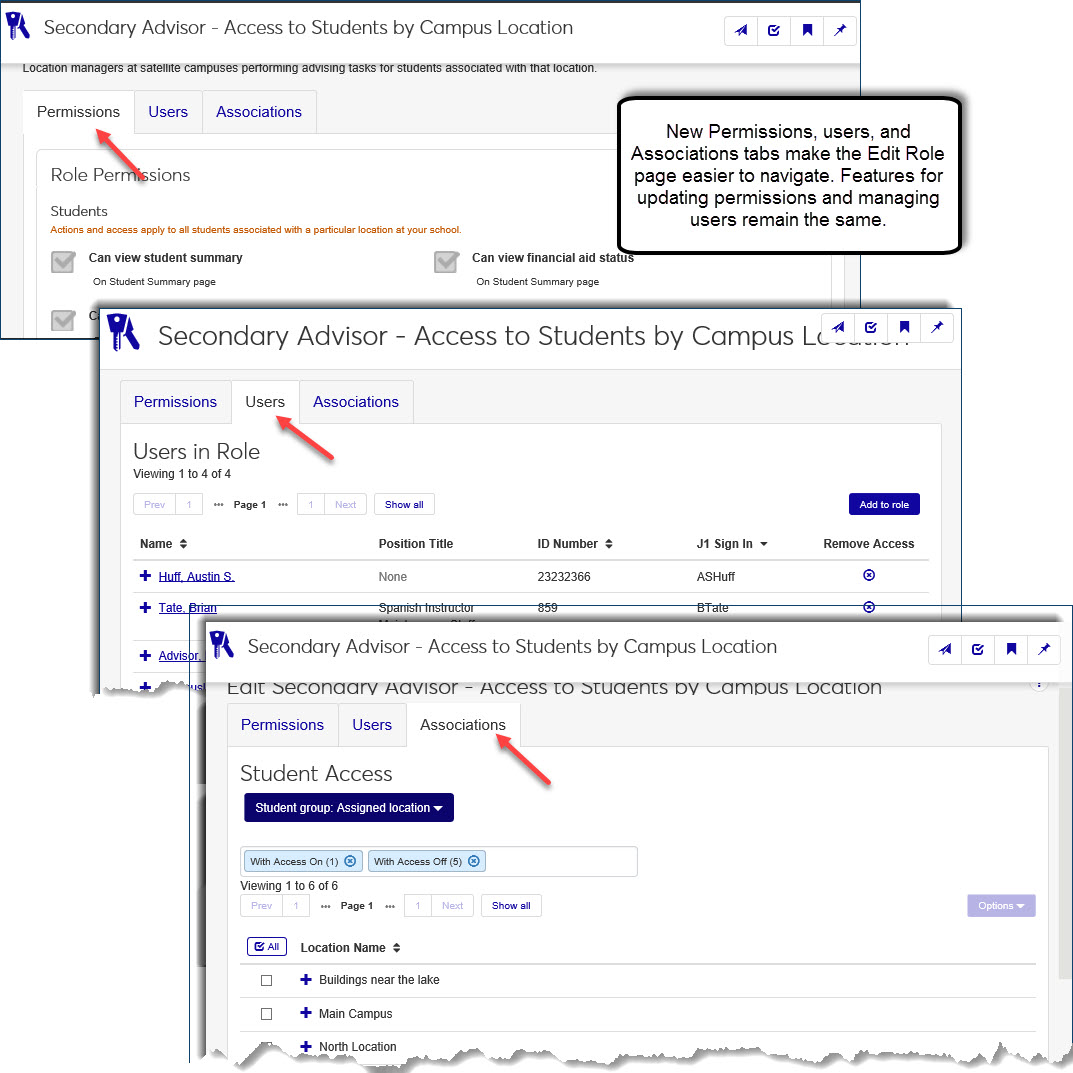
Access to Standard Features and Facilities Updated
With 2019.4, the Transitional Security role has been removed. All users must now belong to the J1 Web user role to access basic J1 Web features such as calendar, tasks, bookmarks, etc. As a part of this change, J1 Web User permissions have been generalized.
Meeting permissions have been added and moved to the following roles:
Academic Advising Module Manager
Advising – Access to All Students
Primary Advisor – Access to Assigned Students
Secondary Advisor – Access to Students by Academic Program, Athletic Roster, and Campus Location
Secondary Advisor – Access to Students by Campus Location
Faculty – Access to Courses and Students by Course
If you want users to be able to create and/or edit meetings, they must belong to a default or copied role with the Can create/edit meetings permission enabled.
The following general facilities permissions are now managed through the new Facilities User role:
View places and spaces
Use the location browser
View pending location approvals
Search location calendars
Create and edit meetings
Users who need access to facilities information must now belong to the new Facilities User role. This allows your school to more efficiently control access to facilities information.
Caution
To ensure users’ access to create and edit meetings, and/or view information about places and spaces isn’t disrupted, verify they belong to a role with the appropriate permissions:
Users that need to create/edit meetings must now belong to a role with meeting permissions (the roles listed above or the new Facilities User role).
Users that need to view location information must now belong to the new Facilities User role.
New Privacy Role
The new J1 Web Privacy role restricts users from accessing any information about a selected group of individuals. This includes prohibiting access to information from the Global Search options or the individuals’ pages.
Notice
Your school may want to prohibit student users from accessing information about board members. You can create a Student Users privacy role and then prohibit users in that role from seeing a group that includes all the board members at your school.
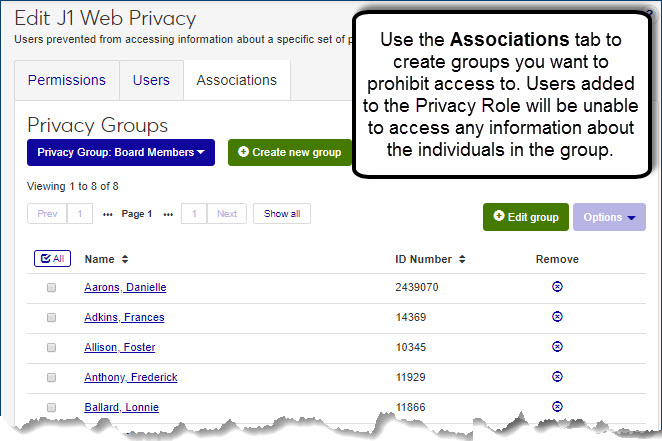
New Permissions
New permissions are available for the following roles:
Business Office User has new view, create, edit, and delete batches and manage budget permissions
Employee Administrator provides new annual statement options that allow users to add/edit W-2 and 1095-C settings
Facilities Manager now includes the location browser permissions
Registration Module Manager and Registrars roles have new competency based education options for viewing, adding, editing and removing CBEs
System User Updates
New Employee Pay Group Filter
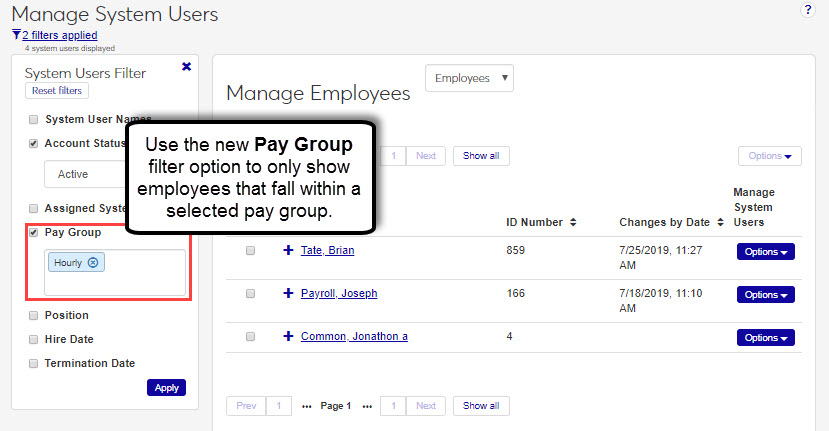
Notice
Users can only see those pay groups they have permission to view (permissions managed on the Desktop HR Group Security Via Payroll window).
Additional Updates
J1 Web log files now include more detailed information about SSO errors.
New measures ensure the SSO authentication verifies the target URL is a valid J1 URL, which prevents open redirect attacks.
Issue | Description |
|---|---|
179202 | The scheduled job "Update Facilities In Use Timeslots" was not optimized and ran slowly. |
180416 | A cross-site scripting vulnerability was found that would have allowed potentially malicious coding to be inserted into the body of messages being sent from J1 Web. |
187373 | The Active Directory (AD) Sync process was automatically activating users as J1 Web users, but the decision and action to allow users to use J1 Web should be left to J1 Web administrators. |
Issue | Description |
|---|---|
165208 | In J1 Desktop the Password Expiration process did not honor the time of day, so it was not possible to expire a password as of a certain time on a given date. The Password Expiration process now tests the time as well as the date. |
New Permission for Approving Academic Plans
The following new permissions have been added to some Advising roles in order to accommodate the My Academic Plan features in Campus Portal:
Can edit academic plans and approve student edits
Any role that previously had permission to edit academic plans now has permission to approve or deny student requests to edit their plans.
This role permission has been added to:
Advising - Access to All Students
Academic Advising Module Manager
Primary Advisor - Access to Assigned Students
Secondary Advisor - Access to Students by Academic Program (secondary advisors can approve/deny student requests on the Student page)
Secondary Advisor - Access to Students by Athletic Roster (secondary advisors can approve/deny student requests on the Student page)
Secondary Advisor - Access to Students by Campus Location (secondary advisors can approve/deny student requests on the Student page)
Faculty - Access to Courses and Students by Course
For more information on the My Academic Plan feature, see Campus Portal Student Features release news.
New Permission for the Registrars Role and the Registration Module Managers Role
With the new Can generate charges permission, users in these roles can generate charges for students during the registration process.
Note
The Generate charges feature is available under these conditions:
Your school has the Accounts Receivable license.
The Allow RE Billing? checkbox is selected for the particular billing period on the Billing Periods window in J1 Desktop.
New System User Filters
The Manage Systems Users page has new Employee options that let users search for employees by position, hire date, and termination date.
Tip
Sign In Page settings let you set up the system to add JICS employees to J1 Web using their JICS credentials. For more information, see the Manage Product Installs and Sign In Methods help.

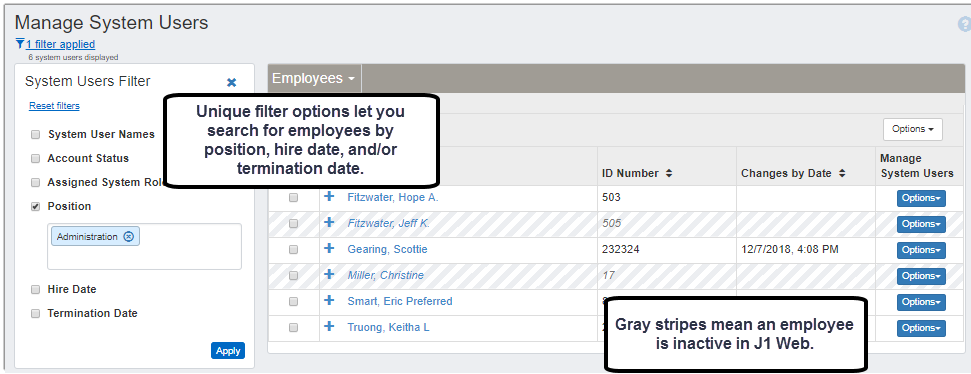
Duo Partnership is Final: Multi-Factor Authentication Feature is Now Available
With J1 2019.1, Jenzabar added a multi-factor authentication (MFA) sign in option. MFA is a layered authentication process that makes it more difficult for an unauthorized person to access your network. Jenzabar's partnership with Duo to provide this feature has been finalized and the multi-factor authentication option can be implemented.
For more information:
System Administration Archive for 2019.1
Manage Product Installs and Sign In Methods [need to add link to online help]
New Role Permissions
Registrars and Registration Module Managers have the following new Student Management permissions available:
New Can remove student divisions permission lets users remove a division from a student’s record on the Manage Student Division and the Student Information Details pages.
New Can remove programs permission lets users remove a program from a student’s record on the Manage Student Division and the Student Information Details pages.
New Can view student notes permission lets users view notepad notes about a student on the student's summary page.
Registration Module Managers also have the following new Student Management permission:
New Can Design student General Info Custom Data permission lets users manage user-defined Student Master table information on the Student Information Details page
Note
These new permissions are available to any roles your school created based on the Jenzabar-provided default role templates.
Issue | Description |
|---|---|
157077 | When the JICS URL is set to an invalid path, several jobs in the Scheduled Jobs service will fail. Further, those failures were causing unrelated jobs to exit unexpectedly. This left J1Web in an unexpected state, as required jobs were not completing. |
167530 | When EXi is configured to use Exchange calendar syncing, it becomes impossible to use JICS as its SSO identity provider, because both features require the use of the APP_USER.DIRECTORY_SERVICE_USERNAME database field, but in conflicting ways. |
167536 | When SSO is correctly configured and users and correctly set up, users are still getting a "Sign in was not successful" message on the sign-in screen and are not able to login. |
167907 | On the My General settings page for a user, the Task and Message Forwarding section sometimes displayed a cached email address for another user. This has been resolved. |
168314 | The SSO Configuration SQL Script published to MyJenzabar.net has been fixed to require signed certificates for user credentials. Schools using SSO should re-run the script to set up that requirement. |
New "Created From" Column
A new Created From column has been added to the Users window. This new column lets you see if a user was created in J1 Desktop or JICS and can be used to help assess login issues.
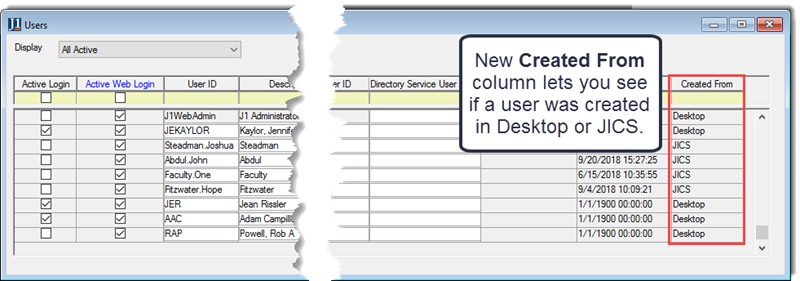
Additional Enhancements
Updates to the installation process eliminate the need to configure the scheduled jobs process. Scheduled jobs are now always set up to run as scheduled even in systems utilizing load balancing.
Group names updated in Active Directory are now updated in the appropriate Desktop tables.
Issue | Description |
|---|---|
114897 | Users received a foreign key error when deleting a group with permissions, members, functions, security, and activities assigned to it from the J1 Desktop Group Definition window. |
142289 | Users that were created in Active Directory (AD) and assigned to the appropriate groups did not remain assigned to the groups in J1 Desktop after the App LDAP Synch job was run. |
153244 | J1 Web users who were removed from the J1 Desktop Users window and then re-added weren't able to log into J1 Web. |
Manage System Users Page Enhancements
The new System User Names drop-down on the Manage System Users page lets you view all system users or just faculty. Filter options let you search for faculty by name, status, role, name, type, term, and/or section.
Note
Sign In Page settings let you set up the system to add JICS faculty to J1 Web using their JICS credentials. For more information, see the Manage Product Installs and Sign In Methods help.
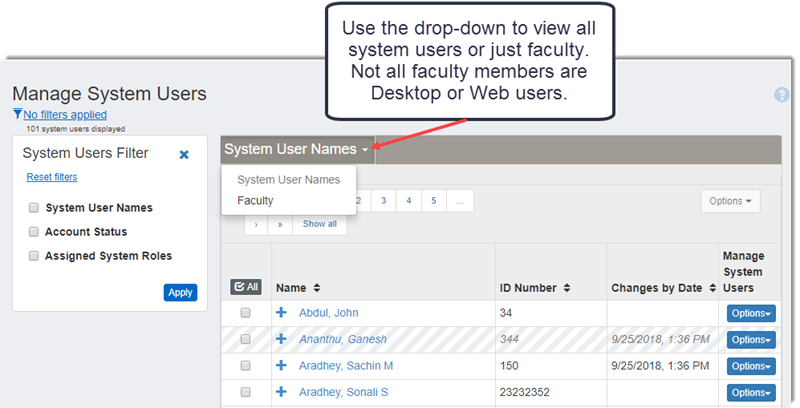
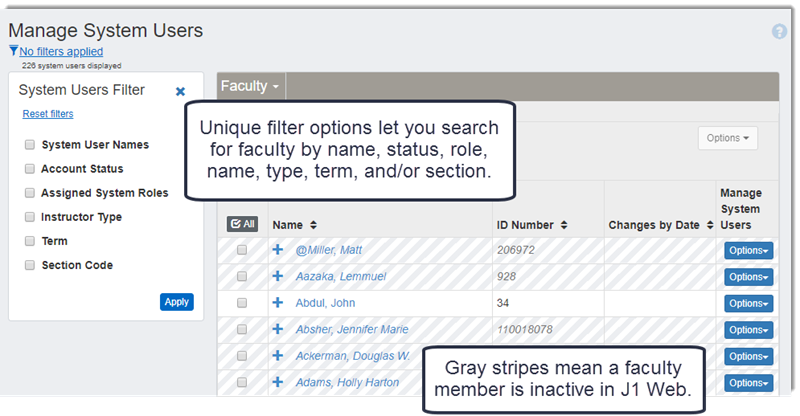
New Outlook Verification Options
A new Verify a mailbox or calendar option on the Calendar Settings page lets you access the new Verify a Mailbox or Calendar for Microsoft Outlook page.
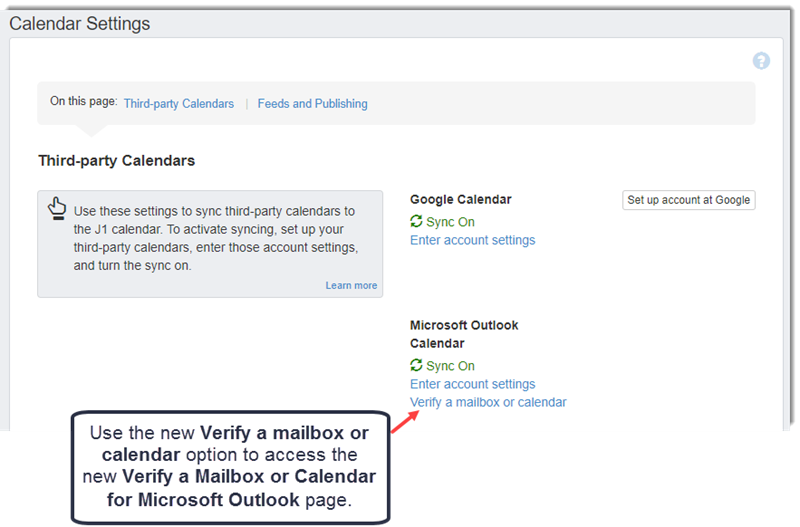
Use this new page to enter a user's name and/or Exchange credentials and test the connection.
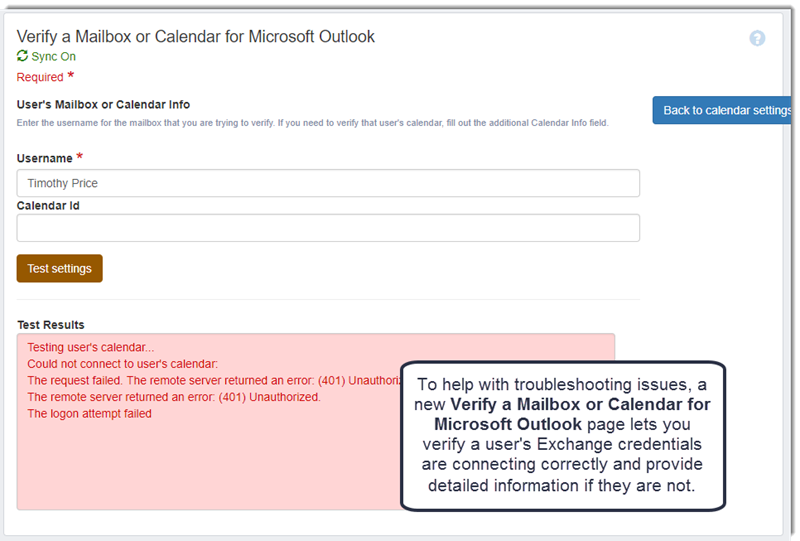
New Permissions for Registration Roles
To facilitate student registration, several roles have new permissions available.
Role | What's New |
|---|---|
Registrars | Section Management permission set Student Management permission set |
Registration Module Managers | Catalog Courses permission set Student Management permission set Section Management permission set |
Faculty Access to Students and Courses and Students by Course | Can view student section list (replaces Can view student course history) |
Additional Enhancements
Sign In Method and Calendar and Third-party Calendars settings no longer require an Internet Information Services (IIS) reset after being updated.
If your school isn’t licensed for a particular J1 Web module, then the scheduled jobs for that specific module no longer run. All schools still run common and standard scheduled jobs.
Two updates were made to the System User Names filter option on the Manage System User page:
Account status information is no longer shown
User IDs now appear next to the names matching the results
Issue | Description |
|---|---|
151343 | Schools were unable to save email addresses ending with a capital letter in the Email field of the Contact Information for Your Support Team setting on the Communications page. |
Reactivate Logins with J1-AD Sync
When a user now returns to a school and the login name is active or re-activated in Active Directory, the system checks to see if the user already exists in J1 Desktop before creating a new user. If a matching login name is found, the record is activated in J1 Desktop.
New Scheduled Jobs History Page
A new View all scheduled jobs link on the Scheduled Jobs block accesses the new Scheduled Jobs History page where users can view a full list of all failed or successful scheduled jobs.
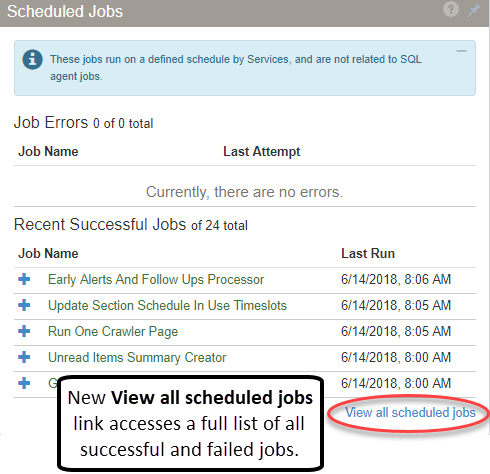
The Scheduled Jobs block on the System Administration Home page shows the 5 most recent scheduled jobs and the new Scheduled Jobs History pages shows a full list of all failed or successful scheduled jobs. Just like the Scheduled Jobs block, users can see information about what a scheduled job does, when it was last run, how frequently it runs and for how long. For failed jobs, users can also see the log incident number making it easier to find the issue in the log file when troubleshooting issues.
The Scheduled Jobs History page includes a filter feature that lets users search for scheduled jobs by a specific keyword.
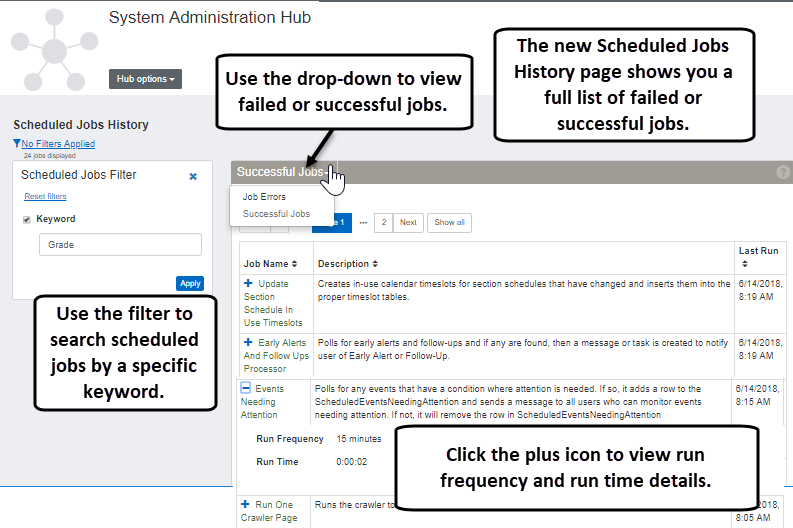
New Version Indicators
To make it easier to distinguish what roles and permissions have been changed or added, version indicators have been added to the System Roles and Edit Roles pages. New Updates by Version and Versions filter options let users choose what release they want to see indicators for. They can chose to see indicators for a specific release, all releases, or no releases.
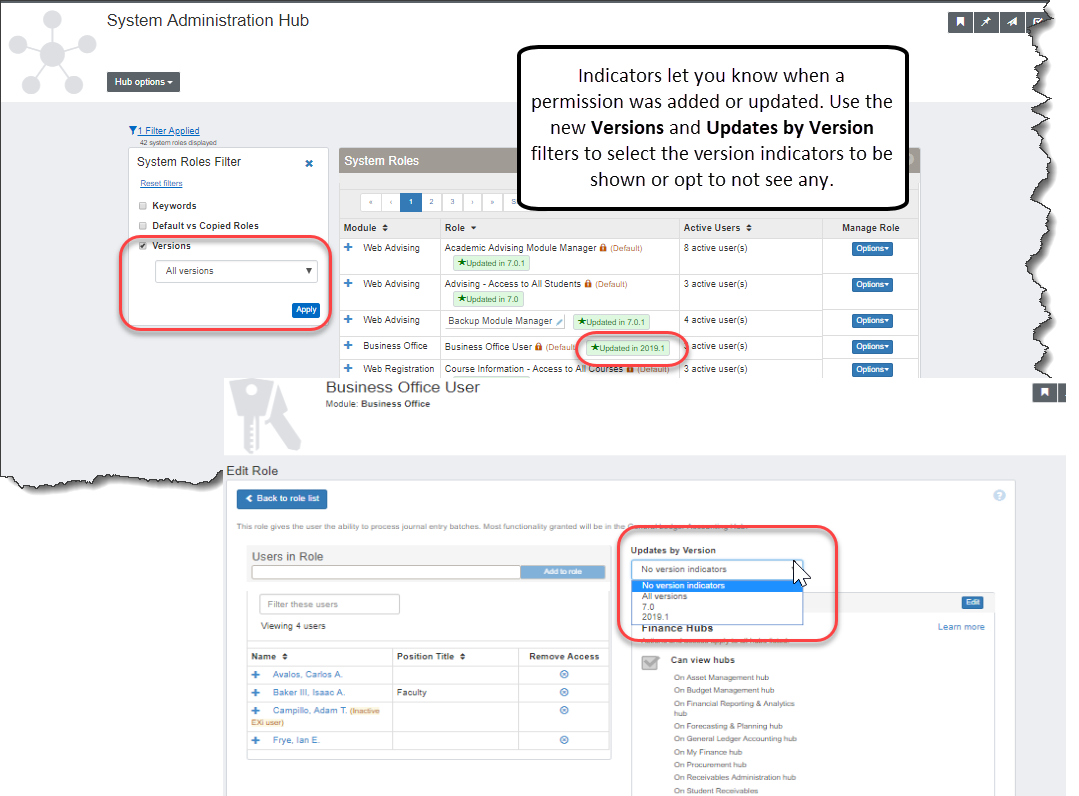
New Multi-Factor Authentication Option
With J1 2019.1, Jenzabar has added a multi-factor authentication (MFA) sign in option. MFA is a layered authentication process that makes it more difficult for an unauthorized person to access your network. A partnership with Duo to provide this feature is imminent and will be announced once official.
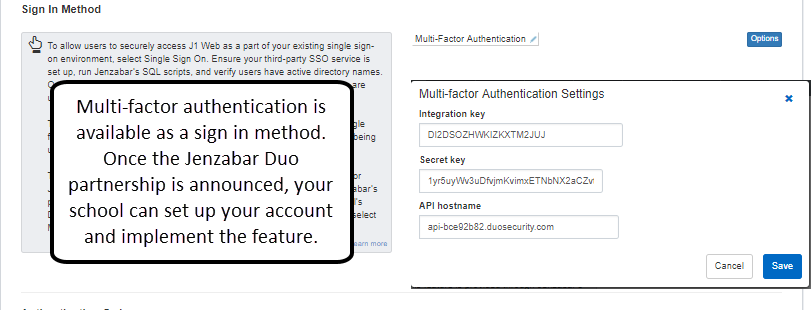
Reorganized Settings
To make System Administration settings easier to find and setup, settings were broken out into three pages: Calendar, Communications, Product Installs and Sign In. To access these new pages, the Hub options were separated into Admin options and Settings and new options were added.
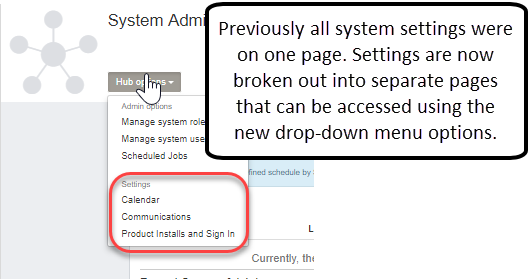
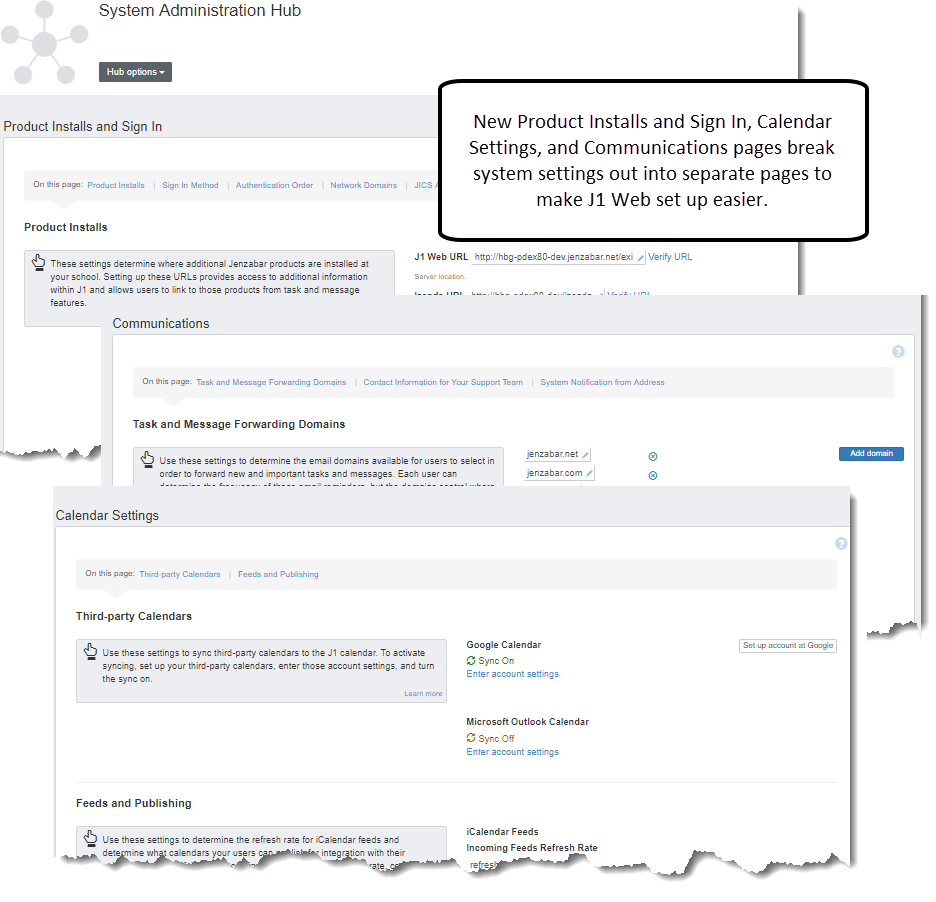
New Filter Options
The Systems Role page has a new System Roles Filter, which allows users to search for roles by keyword and filter them by default versus copied or when the role was added to J1 Web or most recently updated.
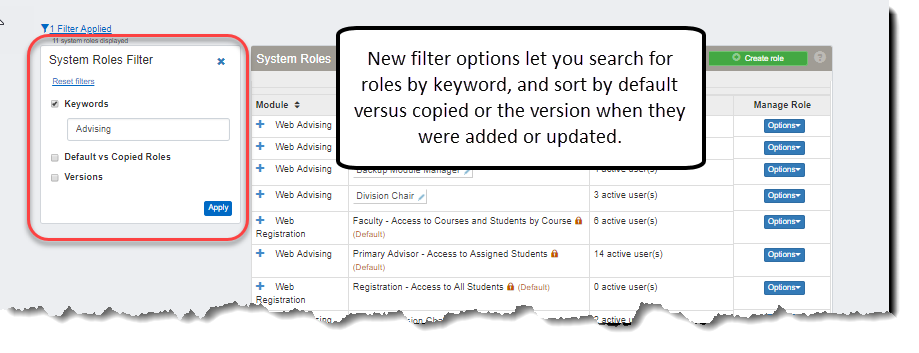
A new Account Status filter option has been added to the Manage System Users page. This filter lets users choose to see only active or only inactive J1 Web system users.
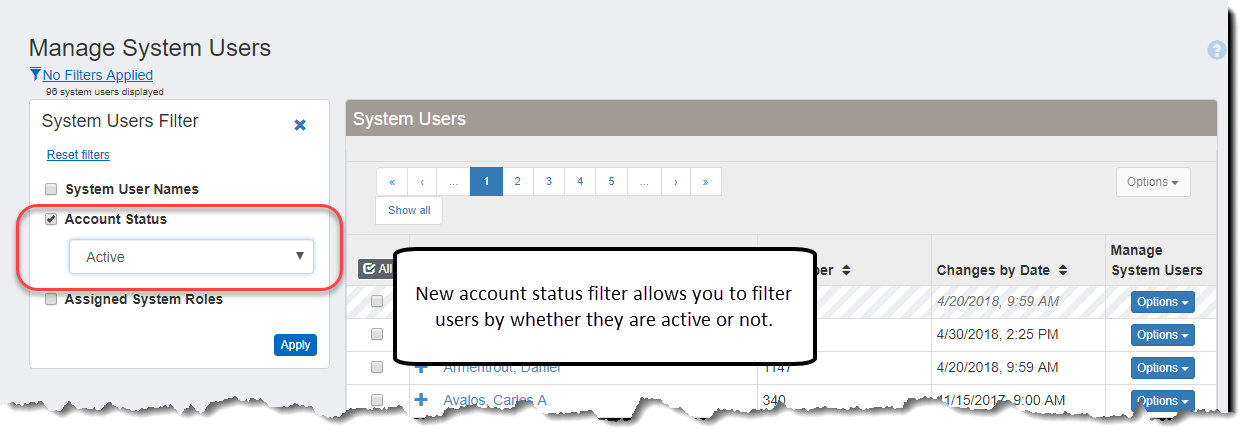
Additional Enhancements
Jenzabar’s cloud help server is now synchronized with the J1 Web URL configuration on the Product Installs and Sign In page. When your school changes the J1 Web URL, the new URL is registered with the cloud server to ensure users can access online help.
Issue | Description |
|---|---|
138875 | Users were unable to bookmark the System Administration hub, System Users page. The bookmark feature for this page now works correctly. |
150133 | System Users page showed JICS login information for users even when a school did not have a JICS URL configured on the Product Installs and Sign In page. |
147290 | Database error occurred when attempting to delete a J1 Web user who had sent Web messages. |
147859 | When two columns in the Facility table requiring data were null, J1 Web Facilities pages did not appear. These columns have been removed and Facilities pages now appear correctly. |
